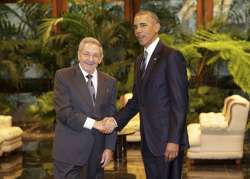Barack Obama, Raul Castro vow to improve US-Cuba relations
Havana - US President Barack Obama and Cuban President Raul Castro vowed on Mondey to set aside the deep divisions that still exist between the two countries. The two leaders, in a joint news conference,

Havana - US President Barack Obama and Cuban President Raul Castro vowed on Monday to set aside the deep divisions that still exist between the two countries. The two leaders, in a joint news conference, prodded each other over human rights and the longstanding U.S. economic embargo.
Obama, standing in Havana's Palace of the Revolution on the second day of his historic visit to Cuba, repeatedly pushed Castro to take steps to address his country's human rights record.
"We continue, as President Castro indicated, to have some very serious differences, including on democracy and human rights," said Obama, who planned to meet with Cuban dissidents Tuesday. Still, Obama heralded a "new day" in the U.S.-Cuba relationship and said "part of normalizing relations means we discuss these differences directly."
Castro was blistering in his criticism of the American embargo, which he called "the most important obstacle" to his country's economic development. He also pressedObama to return the U.S. naval base at Guantanamo Bay, which is on the island of Cuba, to his government.
"There are profound differences between our countries that will not go away," Castro said plainly.
White House officials spent weeks pushing their Cuban counterparts to agree for the leaders to take questions from reporters after their private meeting, reaching agreement just hours before Obama and Castro appeared before cameras. It's extremely rare for Castro to give a press conference, though he has sometimes taken questions from reporters spontaneously when the mood strikes.
While the issue of political prisoners is hugely important to Cuban-Americans and the international community, most people on the island are more concerned about the shortage of goods and their struggles with local bureaucracy.
Castro appeared agitated at times during the questioning, professing to not understand whether inquiries were directed to him.
But when an American reporter asked about political prisoners in Cuba, he pushed back aggressively, saying if the journalist could offer names of anyone improperly imprisoned, "they will be released before tonight ends."
"What political prisoners? Give me a name or names," Castro said.
Cuba has been criticized for briefly detaining demonstrators thousands of times a year but has drastically reduced its practice of handing down long prison sentences for crimes human rights groups consider to be political. Cuba released dozens of prisoners as part of its deal to normalize relations with the U.S., and in a recent report, Amnesty International did not name any current prisoners of conscience in Cuba. Lists compiled by Cuban and Cuban-American groups list between 47 and 80 political prisoners, although Cuban officials describe many as common criminals.
Obama's visit is being closely watched in the United States, where public opinion has shifted in support of normalized relations with Cuba. Still, many Republicans — including some hoping to succeed Obama as president — have vowed to roll back the diplomatic opening if elected.
(With AP inputs)